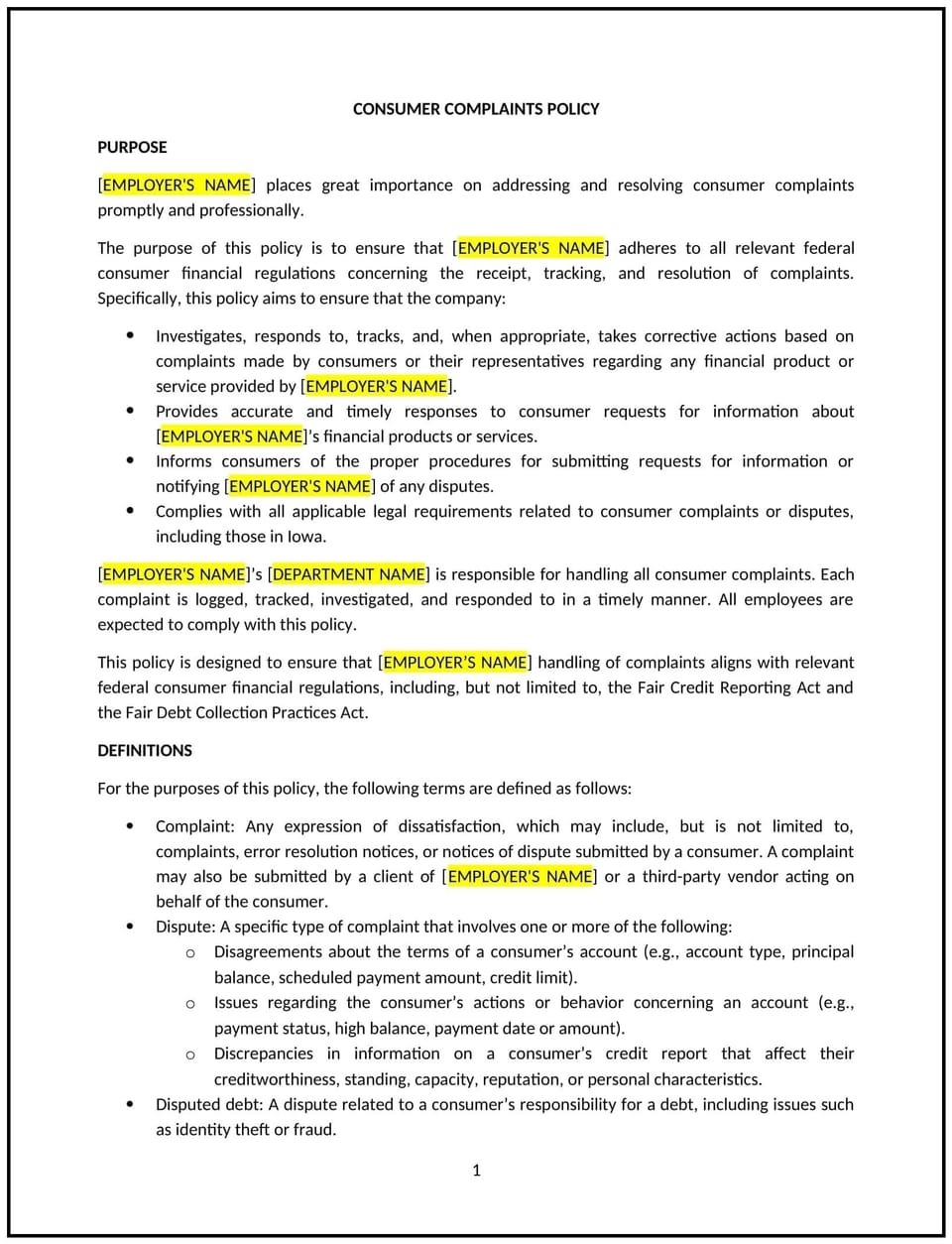Consumer complaints policy (Iowa): Free template

Consumer complaints policy (Iowa)
A consumer complaints policy helps Iowa businesses establish a structured process for handling customer concerns efficiently and professionally. Addressing complaints promptly can improve customer satisfaction, strengthen brand reputation, and reduce potential disputes.
This policy outlines how businesses should receive, document, and resolve consumer complaints while maintaining transparency and responsiveness. It provides a framework for managing complaints fairly and ensuring that feedback contributes to service or product improvements.
By implementing this policy, businesses in Iowa can enhance customer trust, improve service quality, and create a consistent approach to resolving consumer concerns.
How to use this consumer complaints policy (Iowa)
- Define acceptable complaint channels: Specify how consumers can submit complaints, such as by phone, email, online forms, or in person.
- Acknowledge complaints promptly: Establish a process for confirming receipt of complaints within a specific timeframe.
- Document complaint details: Require staff to log all complaints, including the issue, date, customer details, and actions taken.
- Investigate concerns thoroughly: Outline steps for reviewing complaints, gathering relevant information, and assessing resolution options.
- Provide resolution timelines: Communicate expected response times and steps for handling different types of complaints.
- Designate responsible personnel: Assign team members or departments to manage and respond to consumer complaints.
- Offer follow-up communication: Inform consumers of complaint outcomes and any corrective actions taken.
- Review and update: Regularly assess complaint trends and update the policy to improve service and response procedures.
Benefits of using this consumer complaints policy (Iowa)
This policy offers several advantages for Iowa businesses:
- Strengthens customer relationships: Demonstrates a commitment to resolving consumer concerns.
- Enhances brand reputation: Shows responsiveness and professionalism in handling complaints.
- Reduces dispute escalation: Helps prevent legal issues by addressing complaints early.
- Identifies business improvement areas: Provides valuable feedback for refining products and services.
- Increases operational efficiency: Creates a standardized process for managing consumer complaints.
- Builds consumer trust: Encourages customers to engage with the business confidently, knowing their concerns will be addressed.
Tips for using this consumer complaints policy (Iowa)
- Provide clear contact options: Businesses should make it easy for customers to submit complaints through multiple communication channels.
- Train employees on complaint handling: Businesses should educate staff on responding to complaints professionally and empathetically.
- Maintain detailed records: Businesses should document complaint details and resolutions to track trends and improve service.
- Set realistic resolution timelines: Businesses should define how long it takes to respond to and resolve different types of complaints.
- Use complaints for business improvement: Businesses should analyze complaint trends to identify operational or service gaps.
- Follow up with consumers: Businesses should check in with consumers after resolving complaints to confirm satisfaction.
Q: Why should Iowa businesses implement a consumer complaints policy?
A: Businesses should establish this policy to create a structured, professional approach to handling customer concerns and improving service quality.
Q: How should businesses acknowledge consumer complaints?
A: Businesses should confirm receipt of complaints promptly, provide estimated resolution timelines, and maintain open communication throughout the process.
Q: What types of consumer complaints should businesses document?
A: Businesses should document all complaints related to product quality, service issues, billing disputes, or customer service interactions.
Q: Who should be responsible for managing consumer complaints?
A: Businesses should designate a customer service team or specific employees to investigate and resolve complaints effectively.
Q: What steps should businesses take if a complaint cannot be resolved immediately?
A: Businesses should inform the customer of ongoing efforts, provide updates on resolution progress, and set clear expectations for next steps.
Q: How can businesses use consumer complaints to improve operations?
A: Businesses should analyze complaint data to identify trends, adjust policies, and enhance customer service practices.
Q: How often should businesses review their consumer complaints policy?
A: Businesses should reassess the policy annually to ensure it aligns with customer service standards and industry expectations.
Q: Can businesses offer compensation for consumer complaints?
A: Businesses should determine whether refunds, discounts, or goodwill gestures are appropriate on a case-by-case basis.
This article contains general legal information and does not contain legal advice. Cobrief is not a law firm or a substitute for an attorney or law firm. The law is complex and changes often. For legal advice, please ask a lawyer.


